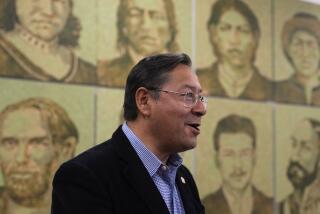Burundi Strongman Calls for Negotiated Peace
- Share via
BUJUMBURA, Burundi — Three days after seizing power in a coup, Burundi’s military-backed strongman appealed Sunday for reconciliation between warring Hutus and Tutsis in the country and called for a “political dialogue” to negotiate peace.
Stepping up his efforts to win Western support and forestall international intervention, Pierre Buyoya also pledged to fight giving immunity to military officers and politicians who have organized massacres of civilians and to restore discipline to an army accused of widespread human rights abuses.
“We’re going to do all we can to stop the killings,” Buyoya told a news conference. The army named him president after it toppled the constitutional government Thursday.
Whether Buyoya will be able to meet those goals will be critical for this frightened and bloodied nation. As the country enjoyed another day of uneasy calm, an army spokesman reported three small-scale attacks by Hutu rebels in the north of the country but no known casualties.
“When the rebels are killed we don’t care,” said Lt. Col. Longin Minani, who seemed far less conciliatory than Buyoya. “We would like that all of them be killed.”
Diplomats, human rights groups and survivors have repeatedly accused the Tutsi-led army of using helicopters, armored cars and scorched-earth tactics against Hutu civilians as well as combatants in a civil war that rarely sees conventional battles or campaigns.
Instead, the conflict has been a deadly series of raids and massacres by Hutu insurgents, largely based in neighboring Zaire, and brutal counter-raids and reprisals by the army. An estimated 150,000 people, mostly civilians, have died since 1993.
The vast majority of Burundians are Hutus, but they have historically suffered at the hands of the 14% Tutsi minority, who run the towns, command the army, dominate the economy, control the schools and own the land. Issues of power and privilege are key to the spiral of ethnic violence.
Buyoya said his coup was partly aimed at preventing an insurrection by hard-line Tutsis who oppose any power-sharing with Hutus. “Gangs from the street were going to overthrow the government and put the country in chaos,” he said.
Later, during a 90-minute meeting with youth leaders, he said he will no longer allow militant Tutsi youths--who for three weeks have been running through the streets of Bujumbura, the capital, each morning with axes and clubs--to carry weapons. The runners had appeared empty-handed earlier in the day.
“His principal objective was to reassure the Hutus and to warn the Tutsis to calm down,” Louis-Marie Nindorera, head of a Hutu-Tutsi youth group, said approvingly after questioning Buyoya at the meeting.
*
Western embassies have softened their criticism of Buyoya, in part because of his moderate message. Most analysts here had expected the coup to lead to a blood bath such as the one unleashed by the 1993 assassination of President Melchior Ndadaye.
Indeed, the fears were so strong that several U.S. Embassy personnel were to be evacuated Friday but couldn’t leave because the army sealed the airport. It reopened Saturday, but the group has stayed, awaiting further developments.
“It may be a false calm, but everyone hopes it will hold,” one diplomat said. “That’s why we’re all treading very cautiously.”
Sylvestre Ntibantunganya, the president overthrown by Buyoya, remained in seclusion at U.S. Ambassador Morris Hughes’ home, where he took refuge Tuesday. The Clinton administration continues to recognize him as president of Burundi because he has not resigned.
For rural peasants, those who suffer the most in Burundi’s war, the coup had little impact. Sixty miles southeast of Bujumbura, in Bururi province, where Hutu attacks and army reprisals have raged since April, barefoot farmers cleared new fields, planted potatoes and harvested tea as usual on the steep hillsides.
“These people go, others come,” Nestor Ntahonkuriye, a 40-year-old tailor, said with a shrug as he sewed pants while talking of the coup. “What’s unfortunate is the war. But the coup? It doesn’t matter to me.”
Down a winding dirt road, Leopold Bangurambona, 30, chopped at the red earth with a hoe. A Hutu tenant farmer, he works for a Tutsi landowner. When fighting erupts, he sleeps in the bush and hopes for the best. He blames politicians, not his neighbors, for the war.
“If the Hutu and Tutsi hate each other, why does the owner give us his boy to watch?” he asked, pointing to a toddler playing nearby.
More to Read
Sign up for Essential California
The most important California stories and recommendations in your inbox every morning.
You may occasionally receive promotional content from the Los Angeles Times.














